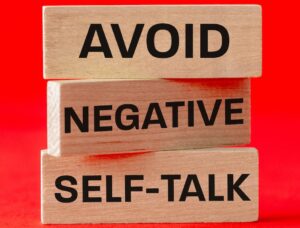 You talk and listen to yourself decidedly more than anyone else. The chatter runs continuously from the moment you wake up until you fall asleep. Talking to yourself is normal and helpful, but negative self-talk can be draining, stressful, and even crippling. Learn how to avoid and change negative self-talk.
You talk and listen to yourself decidedly more than anyone else. The chatter runs continuously from the moment you wake up until you fall asleep. Talking to yourself is normal and helpful, but negative self-talk can be draining, stressful, and even crippling. Learn how to avoid and change negative self-talk.
Objective Self-Criticism Or Habital Self-Harm
Some self-criticism is normal and beneficial. It’s evidence that you can be objective about yourself and helps you become aware of and self-correct unwanted or nonconstructive behaviors.
However, when your self-criticism becomes automatic, habitual, inaccurate, or self-defeating, it’s time for you to assess your behavior, make a change, or seek appropriate assistance.
If you often speak negatively to yourself and are unhappy about this behavior learn how to change your negative self-talk into honest, compassionate, and supportive talk. There never is a need to harm yourself. Even self-criticism can be supportive if delivered the right way.
What is Self Talk
Self-talk or your inner voice is what you say to yourself about yourself. It’s mostly internal, although plenty of people talk aloud to themselves at least sometimes.
According to Caroline Crosson Gilpin of the New York Times, self-talk can be instructional or motivational. The former gives you instructions while the latter offers encouragement such as: “You can do it.”
Another important aspect of talking to yourself is how you speak to yourself. For example, are the thoughts you express positive or negative? Do you use compassionate or coarse language? What is the tone of your voice?
What Is Negative Self-Talk
Psychotherapists, counselors, and coaches frequently help clients with the quality of their self-talk. Typically they encourage more positive and less negative reflections, thoughts, or talk and help tone down the inner critic.
Negative Self-Talk Definition
Negative self-talk is simply the negative thoughts you have about yourself and the tendency of your inner voice to be harsh on yourself rather than compassionate.
Though a straightforward concept, it can be hard to notice when you speak negatively to yourself.
Your negative speech may be triggered. Or, it might be a subconscious response. In either case, you don’t reflect and consider or evaluate alternative ways to view yourself and your situation.
Talking negatively about the self can be enculturated or habitual. If this is true for you, your negative self-talk could seem natural and seemly true to you.
Self-talk includes but is more than limiting beliefs. It’s the whole battery of ways that you criticize yourself, talk yourself down, and obstruct or repaint positive experiences in your life.
Negative Self-Talk Examples
- I’m not that smart. It was just luck.
- I’m just not manager material.
- I’m too fat to wear something like that.
- It was wrong for me to say no. Now I hurt his feelings.
Women and Negative Self-Talk
Women in particular can be negative self-talkers. One 2022 National Institute of Health study found that women suffer from repetitive negative thinking statistically more than men, and the gender gap begins in adolescence and continues through adulthood.
They’re taught to guard against any possible negative impact they could have on others. They are told they should be vigilant, follow the rules, and aim to be perfect examples of their culturally-defined gender stereotype.
Culture suggests that anger, bragging, or even speaking positively about the self is particularly unsightly in a woman. Many parents and subcultures continue to teach women that they should not appear smarter or more competent than men and that they should conform to their husband’s points of view such as dressing or voting a certain way.
What’s the Difference Between Negative and Positive Self-Talk
To be clear, there is very little linguistic difference between positive and negative self-talk. But, they have radically different impacts on your beliefs, emotions, self-esteem, self-worth, and development of your sense of self.
Why You Want to Avoid Negative Self-Talk
You don’t want to talk negatively to and about yourself, particularly habitually. Think about it. If you don’t like it when someone does it to you, why do it to yourself?
Negative Thinking and Your State of Mind
Harsh criticism and disparaging remarks instill disbelief in your character and capabilities; foment self-doubt, pitty, disrespect, and disgust; deflate morale; and limit your expectations for and attainment of success and fulfillment.
Physical Health Effects of Negative Self-Talk
Negative self-talk can also physically affect you. It can lead to stress and the various health conditions associated with chronic and high levels of stress such as depression, sleep disturbances, muscular aches and pain, higher blood pressure, depressed immune system functioning, and digestive issues to list just a few.
Negativity Counters Personal Growth and Development, and Desired Changes
Given the above list of issues associated with negative self-talk, it’s unsurprising that it inhibits or even prevents positive personal growth and development. When you focus on the negative and potential for failure bringing about a desired change can be insurmountable.
How to Change Negative Self-Talk
Encouragement (positive self-talk) is a more direct and impactful force for change than criticism (negative self-talk). Building on your strengths, even the few you believe in, works. And, strengths can create more strengths. For the negative self-talker, this process may be less about creating new strengths and more about validating those you already have.
Stopping negative self-talk is a process. It isn’t something that happens  immediately upon deciding to change. You have to give yourself time to reflect, notice your patterns, take steps to change your outlook, embrace an alternative more positive opinion of yourself, and be that new person. This way, you’ll create a new more accurate opinion of yourself and your abilities.
immediately upon deciding to change. You have to give yourself time to reflect, notice your patterns, take steps to change your outlook, embrace an alternative more positive opinion of yourself, and be that new person. This way, you’ll create a new more accurate opinion of yourself and your abilities.
You don’t need to take all of the following steps and certainly not all at once. Start with those that appeal to you and work with them for a while.
1. Notice the Negative Thoughts You Have About Yourself
You can write them down, journal about them, and become familiar with their common contexts, how they make you feel, and what other thoughts are associated with them. Unhelpful and unsupportive stories you tell yourself will be apparent through this process.
2. Challenge the Validy and Tone of Your Thoughts and Stories
Ask yourself if you could be exaggerating, catastrophizing, or personalizing events or elements of your story. Have you assumed what others think or expect from you? If so, what is more likely the true situation, your role, and others’ points of view? Is there another plausible story? Is it less self-deprecating?
3. Change the Negative Thoughts You Have About Yourself
Turn them around and find real evidence of this new thought. For example, “I’m too self-conscious.” can be changed to “I’m not too self-conscious if I’m prepared.” This allows you to narrow the focus on a known challenge in a given circumstance instead of generalizing behavior to everything you do.
4. Create a New Story
For example, the thought “I’m too slow doing my work” can become “Slow is the right speed for my work because I’m required to be very precise in my analysis of the data I work with.”
Alternatively, tell your story, but change the protagonist. Instead of the story being about you, make it about someone you like and respect. How do the story details and tone change with the new protagonist?
5. Notice and Maintain a List of Your Positive Attributes and Thoughts
Add to the list others’ positive feedback and remarks and any positive attributes you know you possess. You can review this list regularly and use its contents when you create new stories as in item three above.
6. Share Your Perspective With An Honest Confident
Talking about your opinions of yourself, behaviors, and experiences with another person can add objectivity. However, the person must be trustworthy, discrete, and able to offer a constructive perspective.
7. Seek Assistance If Needed
If you have difficulty with these practices or find that they do not result in the desired change, seek assistance from a coach, counselor, or therapist.
Energy healing such as Integrated Energy Therapy and Reiki can also help clear negative energy and release what is no longer serving you.
